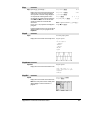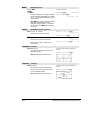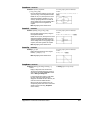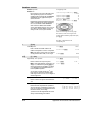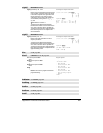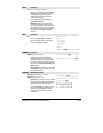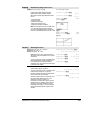
814 Appendix A: Functions and Instructions
DrwCtour CATALOG
DrwCtour
expression
DrwCtour
list
Draws contours on the current 3D graph at the z
values specified by
expression
or
list
. The 3D
graphing mode must already be set.
DrwCtour
automatically sets the graph format style to
CONTOUR LEVELS.
By default, the graph automatically contains the
number of equally spaced contours specified by
the
ncontour Window variable. DrwCtour
draws contours in addition to the defaults.
To turn off the default contours, set
ncontour to
zero, either by using the Window screen or by
storing 0 to the
ncontour system variable.
In 3D graphing mode:
(1/5)x^2+(1/5)y^2ì10!z1(x,y) ¸
Done
L10!xmin:10!xmax ¸ 10
L10!ymin:10!ymax ¸ 10
L10!zmin:10!zmax ¸ 10
0!ncontour ¸ 0
DrwCtour {L9,L4.5,L3,0,4.5,9} ¸
Use the cursor to change the viewing angle.
Press 0 (zero) to return to the original view.
To toggle between different graph format styles,
press ¥ Í
Press X, Y, or Z to look down the
corresponding axis.
í ^ key
mantissa
E
exponent
Enters a number in scientific notation. The
number is interpreted as
mantissa
× 10
exponent
.
Hint: If you want to enter a power of 10 without
causing a decimal value result, use 10^
integer
.
2.3í 4 ¸ 23000.
2.3í 9+4.1í15
¸ 4.1í 15
3ù 10^4
¸ 30000
e
^() ¥ skey
e
^(
expression1
) ⇒
⇒⇒
⇒
expression
Returns
e
raised to the
expression1
power.
Note: On the TI-89 Titanium, pressing ¥ sto
display e^( is different from pressing j
[E].
On the Voyage 200, pressing 2s to display
e^ is different from accessing the character e
from the QWERTY keyboard.
You can enter a complex number in
r
e
i
q
polar
form. However, use this form in Radian angle
mode only; it causes a
Domain error in Degree or
Gradian angle mode.
e^(1) ¸ e
e^(1.) ¸ 2.718...
e^(3)^2 ¸ e
9
e
^(
list1
) ⇒
⇒⇒
⇒
list
Returns
e
raised to the power of each element in
list1
.
e^({1,1.,0,.5}) ¸
{e 2.718... 1 1.648...}
e
^(
squareMatrix1
) ⇒
⇒⇒
⇒
squareMatrix
Returns the matrix exponential of
squareMatrix1
.
This is
not
the same as calculating
e
raised to the
power of each element. For information about the
calculation method, refer to
cos().
squareMatrix1
must be diagonalizable. The result
always contains floating-point numbers.
e
^([1,5,3;4,2,1;6,ë2,1]) ¸
782.209 559.617 456.509
680.546 488.795 396.521
524.929 371.222 307.879








